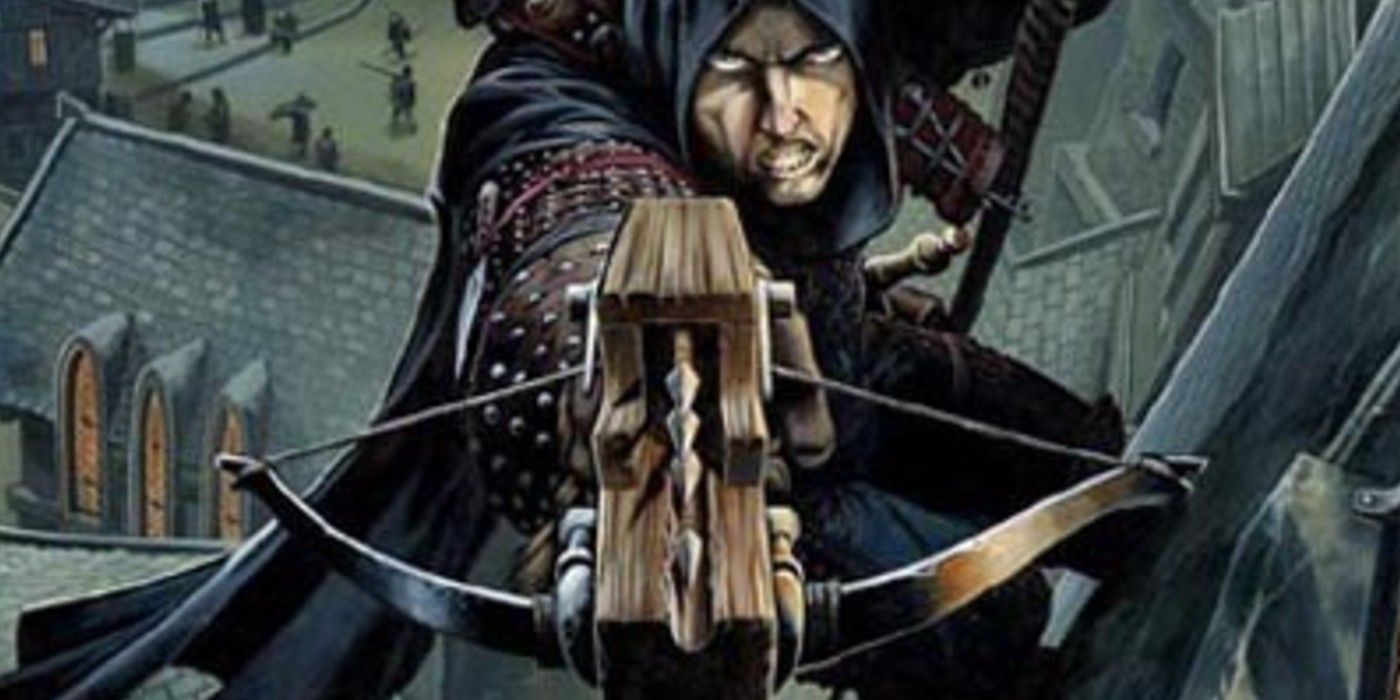Dungeons & Dragons 5e has released its sixth and latest round of Unearthed Arcana playtest content as of June 29, 2023, including sweeping changes to several classes, features, and spells. Players now have the opportunity to try out some of this new content ahead of the 2024 Player’s Handbook re-release and are encouraged to provide feedback on its changes. Building on the original 2014 iteration of the 5e rulebook, this experimental update aims to refine the 5th edition of D&D, which has undergone numerous revisions since its introduction. Some of those changes have been less popular than others.
D&D‘s 2024 Player’s Handbook, which will be re-released alongside updates to its Monster Manual and Dungeon Master’s Guide, is slated to be its biggest and most complete version yet. Wizards of the Coast also intends to make it the most accessible to new players due to the new interest in D&D after the success of the 2023 film Dungeons & Dragons: Honor Among Thieves. To that end, the sixth round of Unearthed Arcana playtest changes not only adds a ton of new content but also tweaks and clarifies much of what was already there; however, the biggest changes are always the most exciting.
10 Commune
Commune is a new 9th-level feature for Clerics. As a rule, Clerics gain their magical powers from a divine source in D&D, usually a god, and may be able to speak directly to their deity through intense prayer. As of the Unearthed Arcana Playtest 6 changes, however, Clerics now receive the spell Commune at 9th level, giving them a direct line to their divine source. Commune allows players to ask three questions of the deity they contact, and receive brief, often one-word answers to each.
Commune was already in the D&D rule book prior to this playtest, but Clerics would have to learn it on a level-up and remember to prepare it after every long rest. This way, Clerics can use their prepared spell slots and newly-learned spells on whatever they find practical while maintaining the connection to the divine source of their powers.
9 Primal Order
D&D‘s Unearthed Arcana Playtest 6 gives Druids a little more choice in how they want to develop their characters. The 1st-level Druid feature allows D&D players to pick one of two roles at 1st level: Magician or Warden. Magician grants an additional cantrip from the list of Primal spells, along with a bonus to Nature checks. Wardens, meanwhile, get proficiency with Martial Weapons and training in Medium Armor. This allows players to choose a magic-focused or melee-focused Druid, instead of being locked into spellcasting. This change also has implications for more fun D&D character creation, as Warden works well for conservationist types, while Magician might better suit those who commune with nature.
8 Steady Aim
Steady Aim is a new class feature for 3rd-level Rogues. D&D‘s Unearthed Arcana lets Rogue players use a Bonus Action during their turn in order to grant themselves Advantage on their next attack roll, as long as it takes place within the same turn. Rogues also can’t move during turns where they use Steady Aim; their movement speed drops to 0 for the duration. The name makes it sound like it’s only designed for D&D Rogues who use ranged weapons, but it applies to any and all attack rolls. Along with Cunning Strike, this allows Rogues to dish out some serious damage.
7 Monks’ Unarmed Strikes Start At 1d6
In previous versions of D&D, Monks start out doing 1d4 worth of damage for every Unarmed Strike they make. This increases every few levels up to a whopping 1d12, but low-level Monks can be pretty underwhelming. As of the sixth Unearthed Arcana playtest rule changes, Monks start out with 1d6 damage on an Unarmed Strike. That puts them roughly on par with other classes’ starting attacks; 1d6 is pretty standard for 1st-level damage. This way, Monks can keep up with their other party members in their first few sessions, even without blowing through all their Ki points (which incidentally, are now called Martial Discipline points).
6 Divine Intervention
Divine Intervention is a Cleric ability that allows characters of that class to call upon their deities in times of need. This usually results in a Cleric spell being cast without the need for components or expenditure of a spell slot. However, in older versions of D&D 5e, this would almost always fail. Players had to roll percentile dice to evoke Divine Intervention, with the result only considered a success if the roll was equal to or less than their Cleric level. That means that at maximum, Divine Intervention would only work 20% of the time, and if it did, it would take a full in-game week to recharge.
D&D‘s Unearthed Arcana Playtest 6 allows Clerics to use this ability once per Long Rest with the effect always guaranteed, provided the spell is of 5th level or less. This seems like a fair balance, preventing Clerics from wasting this ability without making it too powerful.
5 Deft Explorer
The Deft Explorer optional feature becomes mandatory for 1st-level Rangers in D&D‘s Unearthed Arcana, replacing the Natural Explorer feature. Players now gain Expertise (double proficiency) in a Ranger skill of their choice (Animal Handling, Athletics, Insight, Investigation, Nature, Perception, Stealth, or Survival) from 1st level, and can choose two types of preferred terrain. On this terrain, Rangers will receive Advantage on certain Nature and Survival checks. This new version of Deft Explorer effectively combines the optional feature and Natural Explorer, which used to be mutually exclusive. This actually gives players less choice, while allowing them to access a wider range of benefits.
4 Cunning Strike
Cunning Strike is a crafty new feature for the devilish Rogue in D&D. Starting at 5th level, Rogues can use their Sneak Attacks to inflict special effects on enemies at the cost of some of the damage they’d otherwise deal. Tripping, poisoning, or disarming the enemy can give players a huge tactical advantage in D&D, so sometimes it’s worth the sacrifice. This class feature also gets an improvement at the 11th level, allowing players to choose an additional negative effect, and again at 14th level, adding three new debuffs: Daze, Knock Out, and Obscure.
3 Elementalism
The new spell Elementalism is also included in the D&D‘s Unearthed Arcana Playtest 6 changes. Available on the Arcane and Primal spell lists, it gives players control over one of four elements, conjuring up a number of interesting effects. Elementalism allows D&D players to stir up strong breezes, cover areas in dirt or sand, evoke colorful puffs of pungent smoke, or summon water out of thin air. Players can also use this spell to sculpt any of the above elements into a shape of their choice. Elementalism doesn’t have many uses in combat but could come in handy when players need to distract an NPC or put out a fire.
2 Weapon Mastery
This is one of the most sweeping changes in D&D‘s latest playtest rules, covering multiple classes. Monks, Paladins, Rogues, and Rangers now have access to the feature Weapon Mastery from 1st level. This allows them to gain a proficiency bonus for any two weapons of their choice.
What’s even more interesting, though, is that Weapon Mastery lets them change these weapons during a Long Rest. This provides incredible flexibility to those four D&D classes, allowing them to effectively alter their weapon of choice to their whims. Players might find some legendary sword in an ancient crypt, but be unable to use it to its fullest extent because they only have proficiency in bows and clubs. With Weapon Mastery, that’s no worry – players can simply swap proficiencies the next time the party makes camp.
1 Subclass Fixes
With the variety of changes to D&D‘s fifth edition since its 2014 release, some subclasses simply aren’t compatible across different versions of the Player’s Handbook. The sixth Unearthed Arcana playtest fixes this by reverting many class features and subclass rules to their original 2014 incarnations, simplifying and rectifying the process of subclass progression. In addition, Bards have a new subclass, the College of Dance. Other D&D subclasses, like the Cleric’s Trickery Domain, the Monk’s Way of the Four Elements, and the Ranger’s Beastmaster have seen extensive overhauls for balance and enjoyment.
D&D‘s Unearthed Arcana Playtest 6 is now available to all players, and is absolutely free. The feedback survey begins on July 11, 2023, and will be available via D&DBeyond. Wizards of the Coast has announced that similar updates will follow for the Dungeon Master’s Guide and Monster Manual. With all that on the horizon, this latest Unearthed Arcana playtest makes up just a fraction of the sweeping changes coming to Dungeons & Dragons in the near future.
Source: Dungeons & Dragons/YouTube



































































